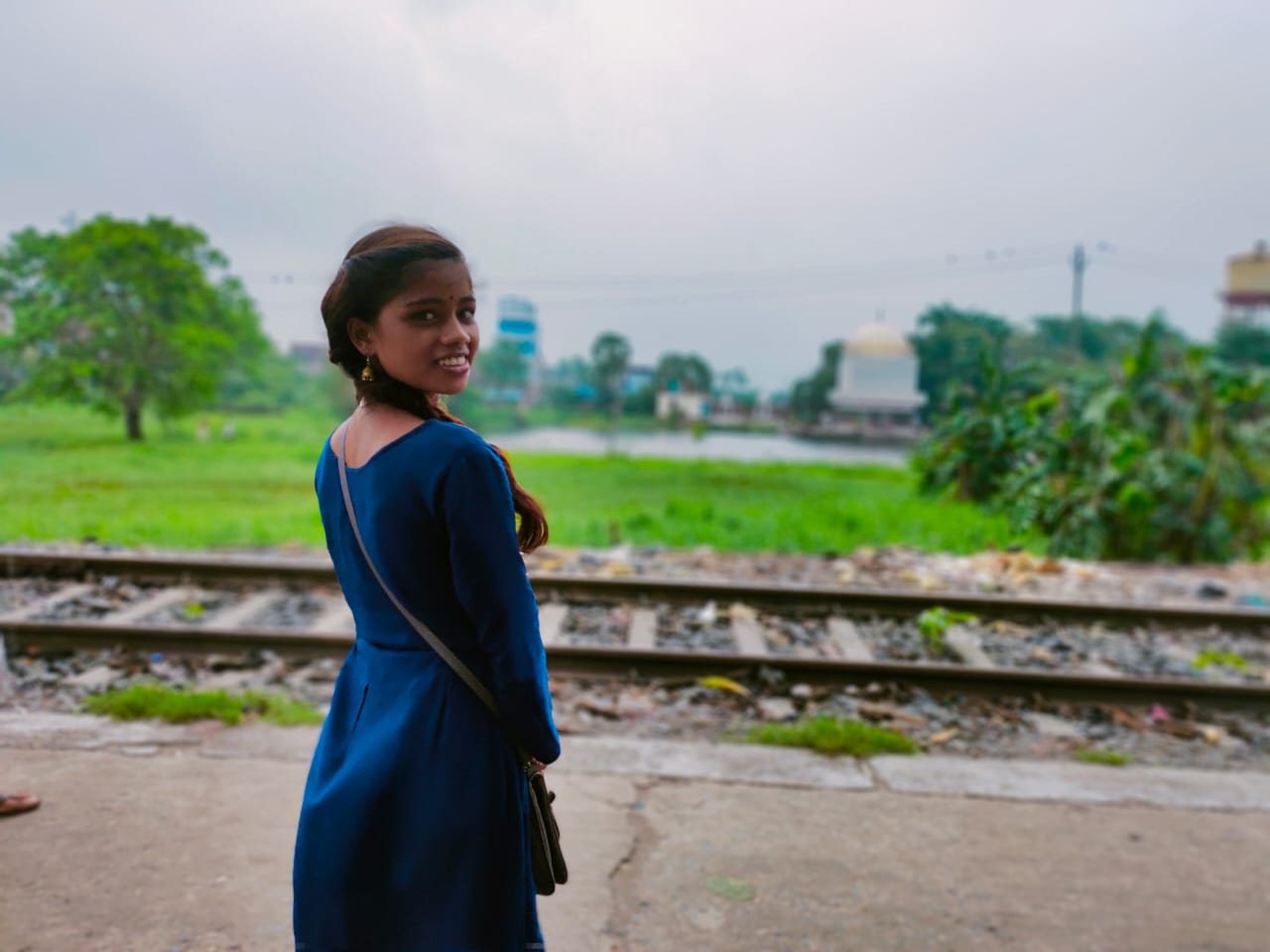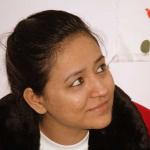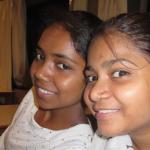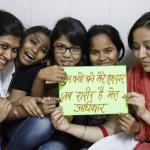Karuna Stories: Shubham From Patna, Bihar
My name is Shubham Kumari, and I live in Patna, Bihar. I have been associated with FAT since 2019.
We are a family of nine. We are six sisters and a brother. My father is a laborer. As a daily wager, he has to earn a living every day and this income sustains our household expenses on a day-to-day basis. As for us sisters, we have to manage, contribute and look after all the household necessities.
I was 8 years old when my brother was born, and my dadi (grandmother) announced that the girls in the house should not study, the opportunity to study should be reserved for sons only. I was in class 6 when my father withdrew us sisters from school. At first we would watch everyone go to school. Then my mother stepped in and we began attending school in secrecy, we would hide from our grandmother and go to school.
When our grandmother found out, she scolded us and complained to our father. My father got violent with my mother because she had allowed us to attend school. We felt really guilty that because of us, our mother was beaten up.
Despite the challenges and family resistance, I completed my Class 10. My elder sister was not as lucky, she dropped out after her Class 8 as she was constantly told it was of no use, that she would have to marry, she was wasting the family money.
After my class 10, I got associated with an organization in our village called Gorakhpur Mahila Samity, a local organization that mobilizes girls and trains them to be footballers. They would also host meetings and sessions on adolescent health, reproductive health, choice and agency building. I started going for these meetings alongside my football practice, in secrecy again. Except for my mother, no one else knew about this.
One day my paternal uncle saw me play in the field, I was wearing shorts and t-shirts, he came home and reported the incident to my father. In the evening when I returned, I was scolded a lot. But the majority of the blame was placed on my mother. My father was about to hit my mother, I held his hand and stopped him.
That night, my father asked me to leave the house. It was raining torrentially but I still left because my father told me to, and I promised myself that I would only come back when he asks me to come back.
That same night once the rain stopped my father came looking for me and took me home. He asked me why I went against his wishes, why I wore small clothes and was playing football, when my uncle's daughters don't even have permission to leave home.
At that time I was 13 and did not know how to reason with my father. Somewhere I also felt that I was wrong in not letting him know what I was doing, so I accepted his anger. After a few months, my father fell severely ill, to the point where he couldn’t speak coherently. At that time, one of my paternal aunts came home and gave the idea to my family that if they married me (14) and my elder sister (16) then the financial crisis of the family would smoothen out. My mother did not tell us about these plans.
The day my aunt came to take us away to be married, I stood up and spoke out. I told her that she is no one to take decisions for me and my life. I told her that it was my choice and my family's decision and she had no right to make that decision. Initially, she tried to explain that it would help us financially and that our future husbands would also contribute to running the house. But when she saw we were not listening, she started saying the same things that others said: that we were spoilt girls, we had become very outspoken, we were mixing with other people, maybe had boyfriends. But, I stood firm and refused to go with her. I even prevented her from taking my elder sister. Since that day our aunt has not visited our house or spoken with us.
After that day, I decided to stand up for my rights., I convinced my father to allow me to play football in a jersey and shorts. He even came to the field to see how the other girls were practicing and then slowly became confident in my participation. Through the organisation I would work on small projects and programmes which would pay me small stipends. I collected those stipends and paid for my higher education. To date, I am earning and paying for my education.
In 2019, I joined FAT for a photography and filming workshop. It was through this program I realized that girls can also learn computers, can use technology to build their careers. I signed up for an eight-day residential workshop. My father was not very confident in sending me out, but with the help of the community mobilizer, he was convinced and I was allowed to attend the workshop.
In the workshop I heard the life stories of other girls like me, I heard their struggles and how they have broken barriers to come and join the workshop. It gave me a sense of belonging and I felt that I am not alone in my struggle, there are other girls also who are making these choices and negotiating for their rights. Through FAT I got to know about different issues like early marriage, our right to choose. I was encouraged to express my dreams and aspirations. I also got to know the reasons behind the barriers or discriminations girls face.
I understood why I was unable to make my family understand. It’s because girls are never taught to speak freely, express or be allowed to do what they want to do. During the workshop, we had a task, where we needed to do a film screening of a film, Khulte Pankh made by the FAT participants. I screened that film in my family and in my community. After that screening, people started understanding me. My father understood my work and stopped constantly objecting to my work.
That day I realized that if we show people what we are they understand better. Also, we need to talk to our family to make them understand our point of view. Today I feel proud that I am the first girl in my extended family who has studied so much and is going to college. Other cousins of mine have not studied beyond class 8 and then been married off. Today I have been able to encourage my elder sister to restart her education.
At FAT, I also made a film - Meri Marzi Meri Azadi where we spoke about our right for us to choose for ourselves, it may be as small as which dress to wear, to as big as when I want to marry. When it was time to screen the film, COVID had set it so we did an online event with other girls who helped make the film and had a discussion on the right to choose with other programme participants of FAT.
During Covid-19 I was also part of the relief work we did in our community through FAT. I was also provided phone recharge so I could join online sessions of the campaign #CoronaNahiKaruna, through which I have shared my personal journey in a session. There I shared how I overcame my barriers.
Joining FAT has been a huge learning opportunity for me. It is because of FAT, I now have the understanding to make decisions and put forth my opinions. FAT has not only given me technical know-how but also provided me with a phone because of which I can attend online meetings, where I am able to learn new things. My association with this organization has brought about a positive change in my life and helped me find my voice. I now have open conversations with my parents and neighbours and take on also instrumental in bringing about a change in my community. I am currently working with 15 other girls in my community. I give them training and share the information I get from FAT. I want to work to give girls the right information, the information that I did not have access to when I was younger.
Despite the progress, we as a household of six young unmarried daughters, continue to endure a lot of pressure from our society to get my older sister married, because of her age. My neighbours still complain to my parents about my leaving the house for work and working itself. I however chose to persevere.
I would like to tell everyone that we should first start having open conversations at home, speak with our family members, and explain to them our stand.
As told by Shubham Kumari, transcribed by Priyanka Sarkar, Daaman Thandi and translated by Vineeta Kumari. Currently, Shubham is participating in the #CoronaNahiKaruna Campaign.




